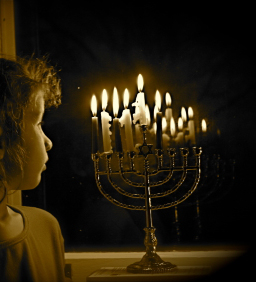
Chinuch refers to realizing the inherent capability…for whichever task, or the capability of a house or an object to fulfill its function… When it is used to refer to the education of children, then the meaning is to raise and develop the child’s nature and capabilities. (Rabbi Kalonymous Kalman Shapira of Piaseczno, Chovas Hatalmidim, Warsaw, 1932, pp. 1.)
Chanukah means consecration. During the eight days of Chanukah we commemorate the miraculous rededication of the Bais Hamikdash by the Chashmonaim in 165 BCE, following three years of contamination at the hands of the powerful Seleucid Greeks.
Chanukah, however, can also be understood as education, consecrating a child for the holy ambition of a Jewish “chinuch.” In this I refer not solely to the transfer of information and ideas, but rather the inculcation of a way of life, a standard of principles and life-shaping ideals that will guide a child to remain on the proper path well into their adult lives. “Chanoch l’naar al pi darko, gam ki yazkin lo yasur mimenu” – Train the youth according to his way, so that even when he ages he will not deviate from it. (Mishlei 22:6)
Chinuch is a topic that deserves special attention during Chanukah, a time when the very essence of Jewish education was threatened by a materialistic, Hellenistic cultural “darkness” that outlawed the study of Torah and the observance of mitzvos at the pain of death.
“The earth was astonishingly empty, and darkness was on the face of the deep, and the spirit of Hashem was hovering over the face of the water.” (Bereishis 1:2) Rabbi Shimon ben Lakish applied this verse to the foreign powers. ‘Now the earth was empty’ symbolizes Babylonia… ‘Astonishingly’ refers to Persia / Media… ‘Darkness’ symbolizes Greece. (Bereishis Rabbah 2:4)
❧❧❧❧❧
Our generation is blessed with a wide-ranging Torah educational system that serves an extensive array of Jewish children. Yet, this success has not been without its challenges. Children often find themselves forced into a system that, for a variety of reasons, does not meet their individual needs. They spend year after year in an endless rut of frustration. Many become disillusioned and turn away as a result. What can be done, by both mechanchim and parents, to stem this growing tide of disconnect?
Fortunately, contained within Shlomo HaMelech’s mandate of “chanoch l’naar” are strategies with which to address and hopefully improve the situation:
- Educate according to their abilities and inclinations – As we know, every child possesses a different blend of learning styles, abilities and interests. (See Malbim, ibid.) It is necessary for educators to guide their students according to the path that their abilities and inclinations dictate (Ralbag, ibid). This requires us to consider differentiated forms of instruction to incorporate all learners and accentuate a wide array of student strengths. It also means that we must be willing to be flexible with our curricular demands, emphasizing more of the affective components of Jewish education, so as to ensure a longstanding sense of connection.
To again quote the Piaseczno Rebbe, “We must raise and educate the person with the aim of drawing out (Hashem’s spirit), revealing it, making it flower, so that he becomes a faithful Jew. The person’s connection to Tradition will thus be borne of free will.” Parents can help facilitate this process by advocating for their children and their specific learning needs. Our goal must be to capture the child’s essence as much as his intellect.
- And according to their temperament – We must be willing to work with all of our children and be exceedingly patient with them, even when they are very challenging. So many of our best and brightest children have been turned off because of their inability to fit in neatly within the established religious, educational and social systems that we have created, sensing their teacher’s or parent’s frustrations and displeasure.
- Educate the entire child – We all have a core list of basic needs, from physiological to physical to emotional, all of which, if not properly met, will hamper our ability to achieve maximal intellectual results. Every child needs to feel like he belongs and is properly cared for as a person, not just as a student. Otherwise, he will seek to satisfy those needs elsewhere, often in environments that are damaging to his physical, emotional, and spiritual well-being.
- Educate with the future in mind (based on Rabbi Samson Raphael Hirsch, Collected Writings, Vol. VII, pp. 411ff.) – We must ensure that our children are not overwhelmed by life’s challenges and experiences. As our students leave the insular walls of the yeshiva, they will invariably be faced with difficult tests, ones never before experienced by past generations. We simply cannot shelter our children from all of these temptations. Rather, we must instill within them a love for Yiddishkeit that is of such a magnitude they will possess the necessary fortitude to resist and ultimately reject these divergent forces. Allow them to ask the difficult questions; children must see that the Torah can and does respond to all matters.
It must be our mission to ensure that each of our children is receiving a Torah chinuch, both in yeshiva and at home, that is “al pi darko.” In so doing, we will hopefully see them develop a deep, long-lasting sense of connection to all that we hold so dear – gam ki yazkin lo yasur mimenu.
_____________________________
Rabbi Naphtali Hoff, PsyD, is President of Impactful Coaching and Consulting. He can be reached at 212.470.6129 or at nhoff@impactfulcoaching.com.



















